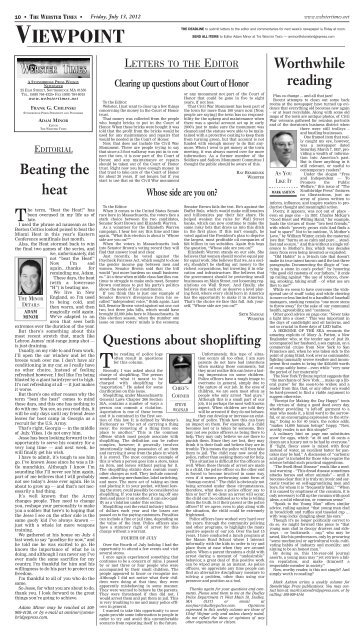friday july 13 - Southbridge Evening News
friday july 13 - Southbridge Evening News
friday july 13 - Southbridge Evening News
Create successful ePaper yourself
Turn your PDF publications into a flip-book with our unique Google optimized e-Paper software.
10 • THE WEBSTER TIMES • Friday, July <strong>13</strong>, 2012<br />
www.webstertimes.net<br />
VIEWPOINT<br />
THE DEADLINE to submit letters to the editor and commentaries for next week’s newspaper is Friday at noon.<br />
SEND ALL ITEMS to Editor Adam Minor at THE WEBSTER TIMES — aminor@stonebridgepress.com<br />
A STONEBRIDGE PRESS WEEKLY<br />
NEWSPAPER<br />
25 ELM STREET, SOUTHBRIDGE MA 01550<br />
TEL. (508) 764-4325• FAX (508) 764-8015<br />
www.webstertimes.net<br />
FRANK G. CHILINSKI<br />
STONEBRIDGE PRESS PRESIDENT AND PUBLISHER<br />
ADAM MINOR<br />
EDITOR<br />
THE WEBSTER TIMES<br />
EDITORIAL<br />
Beating the<br />
heat<br />
The term, “Beat the Heat!” has<br />
been overused in my life as of<br />
late.<br />
I used the phrase ad nauseam as the<br />
Boston Celtics looked poised to beat the<br />
Miami Heat in this year’s Eastern<br />
Conference semifinals last month.<br />
Alas, the Heat stormed back to win<br />
the final two games of the series, and<br />
we, unfortunately, did<br />
not “beat the Heat!”<br />
Now I’m sad<br />
again…thanks for<br />
reminding me, Adam.<br />
These days, the heat<br />
(with a lowercase<br />
“H”) is beating me.<br />
We live in New<br />
THE MINOR England, so I’m used<br />
to being cold, and<br />
DETAILS<br />
then warm, and then<br />
ADAM magically cold again.<br />
MINOR We’ve adapted to an<br />
area that sees both<br />
extremes over the duration of the year.<br />
But there’s something about this<br />
most recent stretch that, much like<br />
Lebron James’ mid-range jump shot —<br />
is just draining.<br />
Usually, on my ride to and from work,<br />
I’ll open the car window and let the<br />
breeze wash over me. I don’t have air<br />
conditioning in my car, so I really have<br />
no other choice. Instead of feeling<br />
refreshed however, I feel like I’m being<br />
blasted by a giant hairdryer set to high.<br />
It’s not refreshing at all — it just makes<br />
it worse.<br />
But there’s one other reason why the<br />
term “beat the heat” comes to mind<br />
these days, and this one has nothing to<br />
do with me. You see, as you read this, it<br />
will be only days until my friend Jesse<br />
leaves for boot camp in Georgia as a<br />
recruit for the U.S. Army.<br />
That’s right, Georgia — in the middle<br />
of July. Yikes. I do not envy him.<br />
Jesse has been looking forward to the<br />
opportunity to serve his country for a<br />
very long time — and next week, he<br />
will finally get his wish.<br />
I have to admit, it’s tough to see him<br />
go. I’ve known Jesse since he was a little<br />
munchkin. Although I know I’m<br />
sounding like I’ll never see him again,<br />
part of me believes that I will probably<br />
not see today’s Jesse ever again. He is<br />
about to grow up — and that’s not necessarily<br />
a bad thing.<br />
It’s well known that the Army<br />
changes people. They need to change<br />
you, reshape your personality to make<br />
you a soldier. But here’s to hoping that<br />
the Jesse I see on the other side is the<br />
same goofy kid I’ve always known —<br />
just with a whole lot more weapons<br />
training.<br />
We gathered at his house on July 4<br />
last week to say “goodbye for now,” and<br />
he told me he was excited to go. He<br />
knows the importance of what he is<br />
doing, and although I can never say I’ve<br />
ever made the same sacrifice for my<br />
country, I’m thankful for him and his<br />
willingness to do his part to protect my<br />
freedom.<br />
I’m thankful to all of you who do the<br />
same.<br />
So Jesse, for what you are about to do,<br />
thank you. I look forward to the great<br />
things you’re going to achieve.<br />
Adam Minor may be reached at 508-<br />
909-4<strong>13</strong>0, or by e-mail at aminor@stonebridgepress.com.<br />
LETTERS TO THE EDITOR<br />
Clearing up questions about Court of Honor<br />
To the Editor:<br />
Webster, I just want to clear up a few things<br />
concerning the money in the Court of Honor<br />
trust.<br />
That money was collected from the people<br />
who bought bricks to put in the Court of<br />
Honor. When these bricks were bought it was<br />
told that the profit from the bricks would be<br />
used for any maintenance and repairs that<br />
would be needed in the Court of Honor.<br />
Now, that does not include the Civil War<br />
Monument. There are people trying to say<br />
that since a 3-foot walkway was put in to connect<br />
the two, it is now part of the Court of<br />
Honor, and any maintenance or repairs<br />
should be taken out of the Court of Honor<br />
trust. Right now you have enough money in<br />
that trust to take care of the Court of Honor<br />
for about 20 years, if not longer, but if you<br />
start to use that on the Civil War monument<br />
To the Editor:<br />
When it comes to the United States Senate<br />
race here in Massachusetts, the voters face a<br />
stark choice between the two candidates,<br />
Senator Scott Brown and Elizabeth Warren.<br />
As a volunteer for the Elizabeth Warren<br />
campaign, I hear her say this time and time<br />
again, “What this election is about is ‘Whose<br />
side are you on?’”<br />
When the voters in Massachusetts look<br />
into Senator Brown’s voting record they will<br />
find that answer loud and clear.<br />
Just recently, he voted against the<br />
Paycheck Fairness Act, which sought to close<br />
the gender income gap between men and<br />
women. Senator Brown said that the bill<br />
would “put more burdens on small businesses.”<br />
At a time when middle class families continue<br />
to struggle to make ends meet, Senator<br />
Brown continues to put his party’s politics<br />
above the needs of his constituents.<br />
If you think this is just one example of<br />
Senator Brown’s divergence from his socalled<br />
“independent voice,” think again. Last<br />
fall, Senator Brown voted against not one, not<br />
two, but three jobs bills, which would have<br />
brought 22,000 jobs here to Massachusetts. In<br />
this election season, when the number one<br />
issue on most voters’ minds is the economy,<br />
The reading of police logs<br />
often result in questions<br />
for this column.<br />
Recently, I was asked about the<br />
charge of shoplifting. The person<br />
wondered what it meant to be<br />
charged with shoplifting by<br />
“asportation.” He asked for some<br />
clarification on this issue.<br />
Shoplifting, under Massachusetts<br />
General Laws Chapter 266 Section<br />
30A, contains a number of ways a<br />
person can commit a violation.<br />
Asportation is one of these terms<br />
and it is contained in the first section<br />
of this law. It is defined by Webster’s<br />
Dictionary as “The act of carrying a thing<br />
away; the removing of a thing from one<br />
place to another.” This is the common<br />
offense which most people associate with<br />
shoplifting. The definition can be rather<br />
complex, however; it generally involves<br />
intentionally taking possession of an item<br />
and carrying it away from the place in which<br />
it is stored. The most common example of<br />
this is when a person goes into a store, takes<br />
an item, and leaves without paying for it.<br />
The shoplifting statute does contain many<br />
other charges as well. They include concealment,<br />
altering merchandise, label switching,<br />
and more. The mere act of taking an item<br />
and placing it in your pocket, without leaving<br />
the store, could possibly be considered as<br />
shoplifting. If you take the price tag off one<br />
item and place it on another, it can also qualify<br />
as a violation under this section.<br />
Shoplifting cost the retail industry billions<br />
of dollars each year and the losses are<br />
passed on to the paying customers. Penalties<br />
can include a fine or jail time, depending on<br />
the value of the item. Police officers also<br />
have a statutory right of<br />
charge without a warrant.<br />
FOURTH OF JULY<br />
or any monument not part of the Court of<br />
Honor that could be gone in five to eight<br />
years, if not less.<br />
That Civil War Monument has been part of<br />
the town for more than 100 years now. [Now,<br />
people are saying] the town has no responsibility<br />
for the upkeep and maintenance when<br />
there was a special account set up in early<br />
2000’s just to make sure the monument was<br />
cleaned and the statues were able to be maintained<br />
with a protective coating to keep them<br />
from turning green, but that account is not<br />
funded with enough money to do that anymore.<br />
When I went to get money at the town<br />
meeting, it was always moved over for more<br />
information. As a former member of the<br />
Soldiers and Sailors Monument Committee I<br />
thought the public should be aware of this.<br />
Whose side are you on?<br />
arrest for this<br />
Over the Fourth of July holiday, I had the<br />
opportunity to attend a few events and visit<br />
several stores.<br />
I once again experienced something that<br />
continues to be a concern of mine. I passed<br />
by or met three or four people who were<br />
accompanied by their small children. The<br />
people appeared to know or recognize me.<br />
Although I did not notice what their children<br />
were doing at that time, they were<br />
apparently misbehaving in some manner.<br />
They were warned to behave by the parents.<br />
They were threatened if they did not, I<br />
would arrest them and put them in jail. This<br />
is very troubling to me and many police officers<br />
in general.<br />
I wanted to take this opportunity to once<br />
again provide some information to people in<br />
order to try and avoid this uncomfortable<br />
scenario from repeating itself in the future.<br />
RAY BEMBENEK<br />
WEBSTER<br />
Senator Brown fails the test. He’s against the<br />
Buffet Rule, which would make millionaires<br />
and billionaires pay their fair share. He<br />
helped weaken the rules for Wall Street<br />
banks, which can now continue to make the<br />
same risky bets that drove us into this ditch<br />
in the first place. If this isn’t enough, he<br />
voted against the President’s plan to deprive<br />
the largest, most profitable oil companies of<br />
$24 billion in tax subsidies. Again this begs<br />
the question, “Whose side are you on?”<br />
Elizabeth Warren stands on our side. She<br />
believes that women should receive equal pay<br />
for equal work. She believes that we, as a society,<br />
shouldn’t be shelling out money to the<br />
richest corporations, but investing it in education<br />
and infrastructure. She believes that<br />
the government should be protecting small<br />
businesses on Main Street, not loosening regulations<br />
on Wall Street. And finally, she<br />
believes that each of us deserve a level playing<br />
field, where every child born in America<br />
has the opportunity to make it in America.<br />
That’s the choice we face this fall. Ask yourself,<br />
“Whose side are you on?”<br />
SETH NADEAU<br />
WEBSTER<br />
Questions about shoplifting<br />
CHIEF’S<br />
CORNER<br />
STEVE<br />
WOJNAR<br />
Unfortunately, this type of situation<br />
occurs all too often. I am sure<br />
parents do not have bad intentions<br />
when making these comments, but<br />
they must realize this can leave a lasting<br />
impression on some children.<br />
Police officers have a tough image to<br />
overcome in general, simply due to<br />
the nature of our job. In the eyes of<br />
children, we are seen most often as<br />
people who only arrest “bad guys.”<br />
Although this is a small part of our<br />
job, it is perhaps the most well known<br />
aspect. When children are told they<br />
will be arrested if they do not behave,<br />
they can develop or increase an existing<br />
fear of police. Think how this can have<br />
an impact on them. For example, if a child<br />
becomes lost or is taken by someone, they<br />
may not see police officers as being there to<br />
help. They may only believe we are there to<br />
punish them. Since they are lost, they may<br />
think it is their fault and believe they are in<br />
trouble. This means the police will then take<br />
them to jail. The child may now avoid the<br />
police, rather than seeking them out for help.<br />
This situation is difficult for the officers as<br />
well. When these threats of arrest are made<br />
to a child, the police officer on the other end<br />
is forced to become involved in some way,<br />
even if it means performing some form of<br />
“damage control.” The child is obviously not<br />
being arrested under these circumstances,<br />
therefore, what does a police officer say to<br />
him or her? If we deny an arrest will occur,<br />
the child can be confused as to who is telling<br />
them the truth. Is it their parent or the police<br />
officer? If we agree, even to play along with<br />
the situation, the child could be extremely<br />
frightened.<br />
Police officers have worked very hard over<br />
the years, through the community policing<br />
and other programs, to highlight the many<br />
positive aspects of our job. Over the last 15<br />
years, I have conducted a lunch program at<br />
the Mason Road School where I interact<br />
informally with the kids in order to try and<br />
place them at ease when they are around<br />
police. When a parent threatens a child with<br />
arrest during a moment of “undesirable”<br />
behavior, a great deal of this positive work<br />
can be wiped away in an instant. As police<br />
officers, we appreciate any time people can<br />
find an alternative disciplinary measure to<br />
solving a problem, other than using our<br />
presence and position as a tool.<br />
Thanks again for your questions and comments.<br />
Please send them to me at the Dudley<br />
Police Department 71 West Main St. Dudley,<br />
MA 01571 or email at<br />
swojnar@dudleypolice.com. Opinions<br />
expressed in this weekly column are those of<br />
Chief Wojnar only and unless clearly noted,<br />
do not reflect the ideas or opinions of any<br />
other organization or citizen.<br />
Worthwhile<br />
reading<br />
Plus ca change ... and all that jazz!<br />
Recent attempts to clean out some back<br />
rooms at the newspaper have turned up evidence<br />
that everything old becomes new again<br />
– or at least recyclable. Along with some old<br />
maps of the town are antique photos, of Civil<br />
War veterans gathered for reunion portraits<br />
and of the downtown business district when<br />
there were still trolleys –<br />
and bustling businesses.<br />
One framed item that really<br />
caught my eye, however,<br />
was a newspaper dated<br />
Saturday, March 7, 1857, providing<br />
a wealth of information<br />
into America’s past.<br />
But is there anything in it<br />
still relevant, or useful to<br />
contemporary readers?<br />
AS YOU Under the slogan “Free<br />
and Independent — To<br />
LIKE IT Promote the Public<br />
Welfare,” this issue of “The<br />
MARK ASHTON <strong>Southbridge</strong> Press” features<br />
no illustrations, just an<br />
array of pieces written to<br />
inform, influence, and inspire readers to productive<br />
thought and meaningful action.<br />
Poetry, it appears, was not out of place –<br />
even on page one – in 1857. Charles McKay’s<br />
“Good Heart and Willing Hand,” for example,<br />
lauds the virtues of those “two best friends,”<br />
with which “poverty grows rich/And finds a<br />
loaf to spare!” Not to be outdone, “A Mother’s<br />
Love,” by William Winter, extols the maternal<br />
love that “burns on so calm and pure ... steadfast<br />
and so sure.” And this without a single reference<br />
to Mother’s Day, which was decades<br />
away from even being invented or exploited.<br />
“Old Habits” is a 10-inch tale that doesn’t<br />
make its true intent known until the last three<br />
paragraphs. Documenting the illogic of “carrying<br />
a stone in one’s pocket” by honoring<br />
“the good old customs of our fathers,” it ends<br />
up railing against “the use of tobacco, chewing,<br />
smoking, taking snuff – of what use are<br />
they to me?”<br />
While we seem to have overcome the widespread<br />
use of snuff today, and while chewing<br />
is more-or-less limited to a handful of baseball<br />
managers, smoking remains “one more stone<br />
to throw away” for the sake of our communal<br />
health, agreeability, and “neatness.”<br />
Other good advice on page one: “Never take<br />
a light into a closet.” This was important in<br />
the days of candlelight and oil lanterns, and<br />
not so crucial in these days of LED bulbs.<br />
A HEROINE OF THE SEA recounts the<br />
amazing exploits of Mary A. Patton, a New<br />
Englander who, at the tender age of just 20,<br />
accompanied her husband, a sea captain, on a<br />
commercial cruise from New York to San<br />
Francisco and, when he was taken sick to the<br />
point of going blind, took over as commander,<br />
fighting unusually severe weather and incompetent<br />
first mates to bring the $350,000 worth<br />
of cargo safely home – even while “very near<br />
the period of her maternity.”<br />
The New York Tribune reprint suggests that<br />
“the merchants of New York … make up a liberal<br />
purse” for the soon-to-be widow, and a<br />
reader from this, that, or any other era would<br />
be hard-pressed to find a viable argument to<br />
suggest otherwise.<br />
“Receipt for Making the Day Happy” touts<br />
the virtues of doing a good deed every day,<br />
whether providing “a left-off garment to a<br />
man who needs it, a kind word to the sorrowful,<br />
or an encouraging expression to the striving.”<br />
Doing so for 40 years, the notice adds,<br />
“makes 14,600 human beings” happy. “Now,<br />
worthy reader, is not this simple?”<br />
A culinary hint on page one substitutes<br />
snow for eggs, which “at 30 and 40 cents a<br />
dozen are a luxury not to be had by everyone.”<br />
If “light, fleecy snow is mixed with flour<br />
instead of water, an excellent batter for pancakes<br />
may be had.” A discussion of “carbonic<br />
acid gas” is included for those who require the<br />
science behind such practical suggestions.<br />
“The Swell-Head Disease” reads like a medical<br />
warning – “This dread disease sometimes<br />
attacks horses and other animals” – until it<br />
becomes clear that it is truly an ironic and sarcastic<br />
treatise on self-aggrandizing men and<br />
boys, for whom it is “frequently fatal.” “When<br />
it is caused by emptiness of the cranium, it is<br />
only necessary to fill up the vacuum with good<br />
ideas, a solid education, or common sense.”<br />
“Speak to the Young Man” offers similar<br />
advice, railing against “that young man clad<br />
in broadcloth and ruffles and tasseled cap …<br />
with ‘soap locks’ dangling about his ears.”<br />
Though it’s no longer politically correct to<br />
do so, we might forward this piece to “that<br />
young man clad in droopy drawers and sideways<br />
– or backwards – cap,” who may be<br />
saved, like his predecessors, only by procuring<br />
“some mechanical or agricultural tools; cultivating<br />
habits of industry and morality; and<br />
aiming to be an honest man.”<br />
By doing so, this 155-year-old journal<br />
asserts, a young man may “yet retrieve a fallen<br />
reputation, and make (him)self a<br />
respectable member in society.”<br />
Now, worthy reader, is this not simple? And<br />
simply worth re-reading?<br />
Mark Ashton writes a weekly column for<br />
Stonebridge Press publications. You may contact<br />
him at: mark@stonebridgepress.com, or by<br />
calling: 508-909-4144.

















